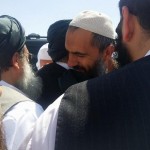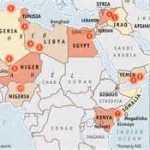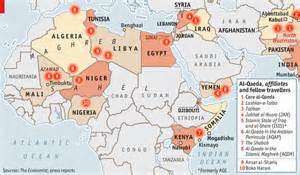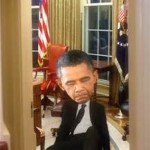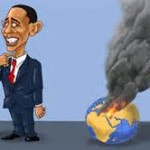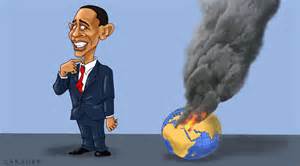Superpowers Don’t Get to Retire
What our tired country still owes the world
By Robert Kagan
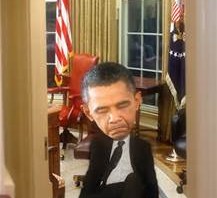
Almost 70 years ago, a new world order was born from the rubble of World War II, built by and around the power of the United States. Today that world order shows signs of cracking, and perhaps even collapsing. The Russia-Ukraine and Syria crises, and the world’s tepid response, the general upheaval in the greater Middle East and North Africa, the growing nationalist and great-power tensions in East Asia, the worldwide advance of autocracy and retreat of democracy—taken individually, these problems are neither unprecedented nor unmanageable. But collectively they are a sign that something is changing, and perhaps more quickly than we may imagine. They may signal a transition into a different world order or into a world disorder of a kind not seen since the 1930s.
If a breakdown in the world order that America made is occurring, it is not because America’s power is declining—America’s wealth, power, and potential influence remain adequate to meet the present challenges. It is not because the world has become more complex and intractable—the world has always been complex and intractable. And it is not simply war-weariness. Strangely enough, it is an intellectual problem, a question of identity and purpose.
Many Americans and their political leaders in both parties, including President Obama, have either forgotten or rejected the assumptions that undergirded American foreign policy for the past seven decades. In particular, American foreign policy may be moving away from the sense of global responsibility that equated American interests with the interests of many others around the world and back toward the defense of narrower, more parochial national interests. This is sometimes called “isolationism,” but that is not the right word. It may be more correctly described as a search for normalcy. At the core of American unease is a desire to shed the unusual burdens of responsibility that previous generations of Americans took on in World War II and throughout the cold war and to return to being a more normal kind of nation, more attuned to its own needs and less to those of the wider world.
If this is indeed what a majority of Americans seek today, then the current period of retrenchment will not be a temporary pause before an inevitable return to global activism. It will mark a new phase in the evolution of America’s foreign policy. And because America’s role in shaping the world order has been so unusually powerful and pervasive, it will also begin a new phase in the international system, one that promises not to be marginally different but radically different from what we have known these past 70 years. Unless Americans can be led back to an understanding of their enlightened self-interest, to see again how their fate is entangled with that of the world, then the prospects for a peaceful twenty-first century in which Americans and American principles can thrive will be bleak.
To understand where America, and the world, may be heading, it is useful to remind ourselves where we have been—of the choices that Americans made decades ago and of the profound, world-changing consequences of those choices. For Americans, the choice was never been between isolationism and internationalism. With their acquisitive drive for wealth and happiness, their love of commerce, their economic and (in earlier times) territorial expansiveness, and their universalistic ideology, they never had it in them to wall themselves off from the rest of the world. Tokugawa Japan and Ming China were isolationist. Americans have always been more like republican Rome or ancient Athens, a people and a nation on the move.
When, roughly 70 years ago, American foreign policy underwent a revolutionary transformation, it was not a transformation from isolationism to internationalism. What Americans had rejected before World War II was a steady global involvement, with commitments to other nations and responsibilities for the general well-being of the world. That was what the so-called “internationalists” of the time wanted for the United States. Theodore Roosevelt, John Hay, Henry Cabot Lodge, Elihu Root, Henry Stimson, Woodrow Wilson, and many others believed that Americans ought to take on a much bigger role in world affairs, as befitted their growing power. The United States had become “more and more the balance of power of the whole globe,” Roosevelt observed, and it ought to behave accordingly. And indeed, following the Spanish-American War and for the first two decades of the twentieth century, the United States did pursue a wider and deeper global involvement than it had ever done before, culminating in the dispatch of two million troops to France. When World War I ended, Wilson, like Roosevelt before him, ambitiously set out to make the United States a central player in world affairs. Beseeched by all the European powers after the war—for American financing aid to steady their economies and for American security guarantees against each other—Wilson wanted the United States to commit itself to an enduring global role. The world, he warned Americans, would be “absolutely in despair if America deserts it.” Wilson’s League of Nations (actually it had been Roosevelt’s idea first), although couched in the idealistic language of universal principles and collective security, was meant above all to serve as the vehicle for American power and influence in support of a new liberal world order.
But Americans rejected this role. Disillusioned by the compromises and imperfections of the Versailles Treaty, mourning the loss of more than 100,000 dead soldiers, skeptical about American participation in the league, and spurred on by Republicans eager to defeat Wilson and recapture the White House, a majority of Americans came to oppose not only the league but also the internationalists’ broad vision of America’s global role. This was no absentminded lapse back into nonexistent isolationist traditions. It was a deliberate decision to turn away from the increasingly active global involvement of the previous two decades, to adopt a foreign policy of far greater restraint, and above all to avoid future military interventions beyond the Western Hemisphere. Wilson’s Republican successors promised, and the American public welcomed, what Warren Harding called a “return to normalcy.”
Normalcy in the 1920s did not mean isolation. Americans continued to trade, to invest, and to travel overseas; their navy was equaled in size only by Britain’s, and had fleets in the Atlantic and the Pacific; and their diplomats pursued treaties to control the arms race and to “outlaw” war. Normalcy simply meant defining America’s national interests the way most other nations defined theirs. It meant defending the homeland, avoiding overseas commitments, preserving the country’s independence and freedom of action, and creating prosperity at home. The problems of Europe and Asia were not America’s problems, and they could be solved, or not solved, without American help. This applied to global economic issues as well. Harding wanted to “prosper America first,” and he did. The 1920s were boom years for the American economy, while Europe’s postwar economies stagnated.
To the vast majority of Americans, normalcy seemed a reasonable response to the world of the 1920s, after the enormous exertions of the Wilson years. There were no obvious threats on the horizon. Postwar Weimar Germany was a faltering republic more likely to collapse than to take another stab at continental dominance. Bolshevik Russia was wracked by civil war and economic crisis. Japan, though growing in power and ambition, was a fragile democracy with a seat on the League of Nations permanent council. To most Americans in the 1920s, the greatest risk to America came not from foreign powers but from those misguided “internationalists” and the greedy bankers and war profiteers who would involve the nation in foreign conflicts that were none of America’s business.
This consensus was broad, deep, and bipartisan, and Americans stayed on the course of normalcy for two full decades. They did so even as the world order—no longer upheld by the old combination of British naval might and a relatively stable balance of power in Europe and Asia—began to fray and then collapse. The Japanese invasion of Manchuria in 1931; Hitler’s rise to power in 1933; Mussolini’s invasion of Ethiopia in 1935; Germany’s remilitarization of the Rhineland, and the German and Italian intervention in the Spanish Civil War, in 1936; Japan’s invasion of central China in 1937; Hitler’s absorption of Austria, followed by his annexation and eventual conquest of Czechoslovakia in 1938 and 1939—all these events troubled and at times appalled Americans. They were not ignorant of what was going on. Even back then information traveled widely and rapidly, and the newspapers and newsreels were filled with stories about each unfolding crisis. Reports of Mussolini’s dive-bombers dropping their ordnance on spear-carrying Ethiopians; Germany’s aerial bombing of the civilian population of Guernica; Japan’s rampage of rape, pillage, and murder in Nanking—they were horrific and regrettable. But they were not reasons for the United States to get involved. On the contrary, they were reasons for not getting involved. The worse things looked around the world, the more hopeless it all seemed, the less Americans wanted to have anything to do with it. The United States, it was widely believed, had no vital interests at stake in Manchuria, Ethiopia, Spain, or Czechoslovakia.
In fact, it was not clear that the United States had vital interests anywhere outside the Western Hemisphere. Even after the German invasion of Poland in 1939, and the outbreak of a general European war that followed, respected American strategic thinkers, priding themselves on “realistic thinking,” the “banishment of altruism and sentiment” from their analysis, and “single-minded attention to the national interests,” advised that, with two oceans and a strong navy standing between America and every great power in the world, the United States was invulnerable.A Japanese attack on, say, Hawaii, they ruled out as literally impossible. Republican Senator Robert A. Taft felt confident in saying that no power “would be stupid enough” to attack the United States “from across thousands of miles of ocean.” Nor would the United States suffer appreciably if Nazi Germany did manage to conquer all of Europe, including Great Britain, which by 1940 the realists regarded as a foregone conclusion. Taft saw no reason why the United States could not trade and conduct normal diplomacy with a Europe dominated by Nazi Germany just as it had with Great Britain and France. As the historian Howard K. Beale put it, nations “do not trade with one another because they like each other’s governments but because both sides find the exchange of goods desirable.”
Holders of such views were tagged with the disparaging label of “isolationist,” but as Hans Morgenthau later pointed out, they believed at the time that they were upholding the “realist tradition of American foreign policy.” The United States should not range “over the world like a knight-errant,” Taft admonished, “[protecting] democracy and ideals of good faith and [tilting] like Don Quixote against the windmills of fascism.” Taft insisted on seeing the world as it was, not as idealists wished it to be. The European war was the product of “national and racial animosities” that had existed “for centuries” and would continue to exist “for centuries to come,” he argued. To make a difference in the war, the United States would have to send millions of troops across the ocean, make an impossible amphibious landing on shores heavily defended by German forces, and then march across Europe against the world’s strongest army. The very thought was inconceivable. Much as they might wish to help Europe, therefore, Americans had “no power, even if we have the will, to be its savior.”
This view was so dominant and so politically popular that Franklin Roosevelt spent his first years in office muzzling his internationalist instincts and vowing to keep America out of another war—“I hate war!” he roared in a famous address in 1936. After Munich, however, he grew panicked, sensing that the Western powers, Britain and France, had lost the will to stand up to Hitler. And so he began trying to warn Americans of what he regarded as the coming threat. Yet it was difficult to counter the realists’ hardheaded analysis. Roosevelt could not prove that American security was directly endangered by what was happening in Europe. He was left making a case that really did appeal more to sentiment and idealism than to demonstrable threats to the American homeland.
Even if the United States faced no immediate danger of military attack, Roosevelt argued, if Hitler, Mussolini, and Imperial Japan were allowed to have their way, the world would be a “shabby and dangerous place to live in—yes, even for Americans to live in.” America would become a “lone island” in a world dominated by the “philosophy of force.” The “institutions of democracy” would be placed at risk even if America’s security was not, because America would have to become an armed camp to defend itself. Roosevelt urged Americans to look beyond their immediate physical security. “There comes a time in the affairs of men,” he said, “when they must prepare to defend, not their homes alone, but the tenets of faith and humanity on which their churches, their governments, and their very civilization are founded. The defense of religion, of democracy, and of good faith among nations is all the same fight. To save one we must now make up our minds to save all.”
Such arguments, along with the fall of France and the Battle of Britain, did help convince Americans that they had a stake in the outcome of the European struggle, but it did not convince them to go to war. That decision followed only after Pearl Harbor. The Japanese attack, Hitler’s subsequent declaration of war, and America’s full-scale entry into the conflicts in both Europe and Asia were a traumatic shock to Americans, especially for those in positions of power. That which had been deemed impossible had proved possible, and long-held assumptions about American security in a troubled world collapsed in a single day.
This view was so dominant and so politically popular that Franklin Roosevelt spent his first years in office muzzling his internationalist instincts and vowing to keep America out of another war—“I hate war!” he roared in a famous address in 1936. After Munich, however, he grew panicked, sensing that the Western powers, Britain and France, had lost the will to stand up to Hitler. And so he began trying to warn Americans of what he regarded as the coming threat. Yet it was difficult to counter the realists’ hardheaded analysis. Roosevelt could not prove that American security was directly endangered by what was happening in Europe. He was left making a case that really did appeal more to sentiment and idealism than to demonstrable threats to the American homeland.
Even if the United States faced no immediate danger of military attack, Roosevelt argued, if Hitler, Mussolini, and Imperial Japan were allowed to have their way, the world would be a “shabby and dangerous place to live in—yes, even for Americans to live in.” America would become a “lone island” in a world dominated by the “philosophy of force.” The “institutions of democracy” would be placed at risk even if America’s security was not, because America would have to become an armed camp to defend itself. Roosevelt urged Americans to look beyond their immediate physical security. “There comes a time in the affairs of men,” he said, “when they must prepare to defend, not their homes alone, but the tenets of faith and humanity on which their churches, their governments, and their very civilization are founded. The defense of religion, of democracy, and of good faith among nations is all the same fight. To save one we must now make up our minds to save all.”
Such arguments, along with the fall of France and the Battle of Britain, did help convince Americans that they had a stake in the outcome of the European struggle, but it did not convince them to go to war. That decision followed only after Pearl Harbor. The Japanese attack, Hitler’s subsequent declaration of war, and America’s full-scale entry into the conflicts in both Europe and Asia were a traumatic shock to Americans, especially for those in positions of power. That which had been deemed impossible had proved possible, and long-held assumptions about American security in a troubled world collapsed in a single day.
Then there was the global economy. In the late 1920s and throughout the 1930s, the United States had sought mostly domestic remedies for the Great Depression, raising its own tariffs, choking off lending abroad, refusing to join other nations in a common monetary policy, and generally protecting the American economy while ignoring the world economy. By 1941, however, Roosevelt and his advisers had concluded that both America’s prosperity and its security depended on a healthy world economy. Poverty and economic dislocation had played a major role in the rise of both Hitler and Bolshevism. The United States bore much of the blame, for although it had been the world’s leading economic power in the 1920s and 1930s, it had failed to play a constructive and responsible role in stabilizing the global economy.
Finally, there was the issue of American public support for global involvement. In the 1920s and 1930s, Americans had been allowed and even encouraged by their political leaders to believe that the United States was immune to the world’s troubles. They could not be allowed to fall back into such complacency. They could no longer regard events thousands of miles away as of no concern to them. To Roosevelt, assuring public support for a larger and more consistent American role in the world was going to be among the greatest challenges after the war. Americans had to understand, as Reinhold Niebuhr wrote in April 1943, that “the world problem cannot be solved if America does not accept its full share of responsibility in solving it.”
That share was to be sizeable. convinced that World War II had been the result not of any single incident but rather of the overall breakdown of world order, politically, economically, and strategically, American leaders set out to erect and sustain a new order that could endure. This time it was to be a world order built around American economic, political, and military power. Europeans had proved incapable of keeping the peace. Asia was entirely unstable on its own. Any new order would depend on the United States. It would become the center of a new economic system that would encourage open trade and provide financial assistance and loans to nations struggling to stay afloat. It would take a substantial and active part in the occupation and transformation of the defeated powers, ensuring that some form of democracy took root in place of the dictatorships that had led those nations to war. America would also have to possess preponderant military strength and when necessary deploy sufficient power to preserve stability and security in Europe, Asia, and the Middle East.
Military force played a central part in the calculations of Roosevelt and his advisers as they set out to establish and defend the new liberal world order. “Peace must be kept by force,” Roosevelt insisted. There was “no other way.” He anticipated that an American occupation force of one million troops would be necessary to keep the peace in Europe, for at least a year and perhaps longer. During the war, the Joint Chiefs envisioned establishing military bases around the world in “areas well removed from the United States” so that any fighting would take place “nearer the enemy” rather than near American territory.
That share was to be sizeable. convinced that World War II had been the result not of any single incident but rather of the overall breakdown of world order, politically, economically, and strategically, American leaders set out to erect and sustain a new order that could endure. This time it was to be a world order built around American economic, political, and military power. Europeans had proved incapable of keeping the peace. Asia was entirely unstable on its own. Any new order would depend on the United States. It would become the center of a new economic system that would encourage open trade and provide financial assistance and loans to nations struggling to stay afloat. It would take a substantial and active part in the occupation and transformation of the defeated powers, ensuring that some form of democracy took root in place of the dictatorships that had led those nations to war. America would also have to possess preponderant military strength and when necessary deploy sufficient power to preserve stability and security in Europe, Asia, and the Middle East.
Military force played a central part in the calculations of Roosevelt and his advisers as they set out to establish and defend the new liberal world order. “Peace must be kept by force,” Roosevelt insisted. There was “no other way.” He anticipated that an American occupation force of one million troops would be necessary to keep the peace in Europe, for at least a year and perhaps longer. During the war, the Joint Chiefs envisioned establishing military bases around the world in “areas well removed from the United States” so that any fighting would take place “nearer the enemy” rather than near American territory.
A must to continue to read here.

